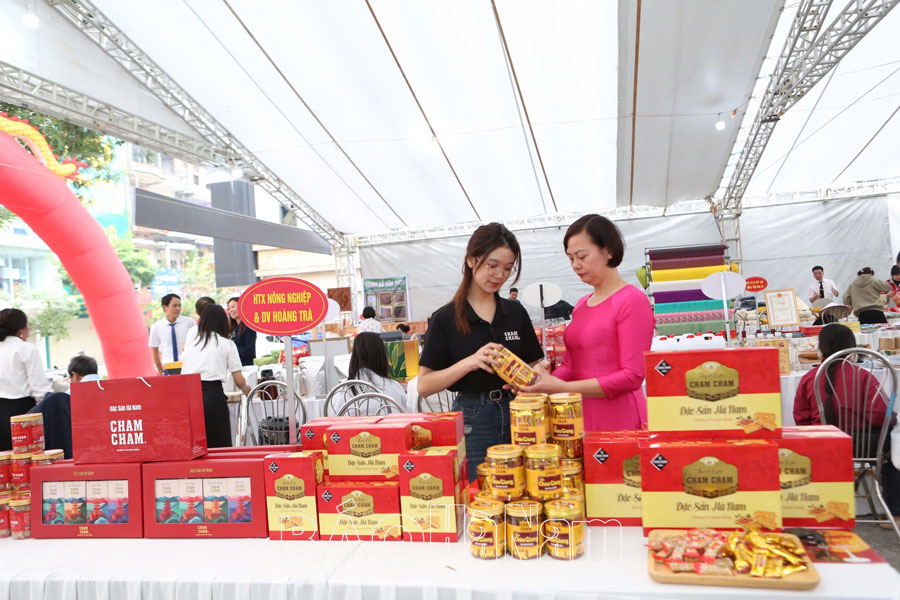
Reporter: The reality of agricultural production development in our province over the past years has affirmed the important role of cooperatives in agriculture. However, some localities still do not fully understand the role, importance, nature and goals of cooperatives in agricultural development. What is your opinion on this issue?
Mr. Do Xuan Truong: As we know, agricultural production in the past was very fragmented, small-scale, and the household scale was not large. When the production scale is too small, it is difficult to produce large-scale goods; it is difficult to apply technical advances. Fragmentation, small-scale, and spontaneous production are major bottlenecks that have plagued the agricultural sector for many years. To produce large-scale production, it is necessary to accumulate land, connect, and gather farmers. Only when farmers join hands to cooperate can land be concentrated. Therefore, cooperatives are one of the important solutions to concentrate land on a large scale, thereby building raw material areas, specialized areas, and producing according to a synchronous and unified process, creating products of uniform quality and design.
The production reality in the communes of Nguyen Uy (Kim Bang), Dong Du (Binh Luc), Nhan Nghia (Ly Nhan); Moc Hoan, Trac Van (Duy Tien)... has proven that on the same cultivated area, if there is only one farmer producing, the results will be very different from many farmers working together. Obviously, the land cannot expand, but when the thinking of farmers changes, they know how to connect, and break down the boundaries of the fields, the production space will open up, bringing about great changes. The large production space allows farmers to easily apply science and technology, apply mechanization, automation, creating a chain of industries, from production, harvesting, preliminary processing, processing and bringing to market.
However, besides localities that care about and create conditions for cooperatives to promote their effectiveness, there are still some localities that, due to many institutional and customary reasons, have not seen the benefits and short-term and long-term goals of cooperatives; have not considered cooperatives as a solution to shift from fragmented, small-scale agriculture to large-scale, thereby restructuring the industry based on the cooperation of producers through cooperative representatives.
Reporter: In the context of agricultural land being at risk of shrinking due to conversion of land use purposes to serve the socio -economic development tasks of the locality, the operations of cooperatives, which were already difficult, are now even more difficult?
Mr. Do Xuan Truong: That's right! The increasingly narrowing area means that the application of science and technology to production will be difficult; the linkage in the production of concentrated goods with large output is also very difficult to ensure regularly and continuously; especially when the linkage between agents in the same chain and the vertical linkage between industries is still limited. The horizontal linkage between farmers, between cooperatives and cooperatives, and between enterprises is currently only at the level of sharing experiences. Or the preliminary processing and processing stages are also only at a rudimentary level, not forming a strong horizontal linkage to unify the price and quality of agricultural products supplied to the market.
The biggest challenge in developing the agricultural value chain in Ha Nam today is the unreasonable agricultural production structure and low agricultural productivity. Meanwhile, the need for green development and sustainable development requires farmers, cooperatives and businesses to innovate production processes and apply technology to limit post-harvest losses.
The reason is that the use of natural resources to serve agricultural production of the people is still unreasonable, leading to land degradation, pollution of land, water and air. This makes agricultural production unsustainable, difficult to develop value chains and affects exports. Moreover, people and cooperatives currently do not seem to have diverse market information, leading to difficult consumption while output is an extremely important step in chain development as well as cooperative development. The bottlenecks from technology application, market search, traceability, logistics and linkage are causing the agricultural value chain in Ha Nam to not really develop.
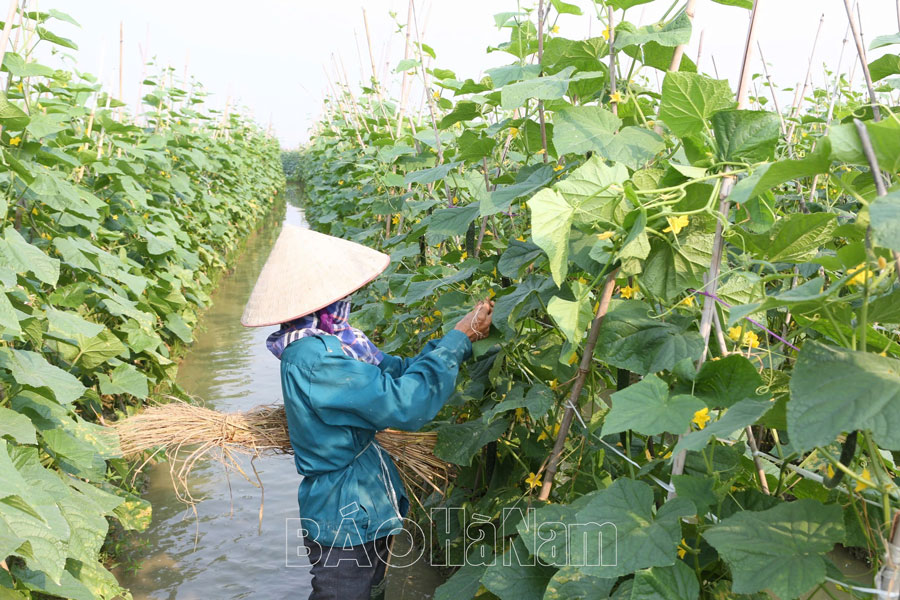
By the end of 2024, there will be 10 cooperatives in the province applying advanced technology in their operations and production and business activities, and 38 cooperatives linking production according to product value chains. Some typical models in value chain activities include the Agricultural Service Cooperatives: La Son, An Ninh, Nhan My linking with enterprises to purchase products for members; typical models of applying high technology such as Dong Du High-Tech Agricultural Cooperative applying drip irrigation technology to care for grape trees, Minh Duc Herbal Cooperative applying the cold storage process to produce cordyceps, Khanh Linh Dry Pho Vermicelli Cooperative applying a synchronous production line of dryers to produce dry pho. Typical models in digital transformation and green economy such as Hoang Tra Cooperative applying freeze-drying technology to produce lotus tea, selling on youtube platform..., Phu Van Ornamental Plant Ecotourism Cooperative combining sightseeing tourism with ornamental plant production, Hai Dang River Aquatic Products Cooperative applying technology to create flow in ponds to produce commercial fish, Hong Tien Nha Xa Silk Weaving Ecotourism Cooperative combining traditional craft development with tourism...
Although the above figures have affirmed the position and role of cooperatives in management, operation and production organization, they have not really promoted their role as a fulcrum of circular agriculture and green agriculture; especially when agriculture has been identified as the pillar of the province's economy in recent years. In fact, there are still many people and cooperatives who have to explore and find ways to consume agricultural products for themselves.
Reporter: So what do you think is the solution here?
Mr. Do Xuan Truong: I think that if we want cooperatives to develop, we must first understand the capacity and nature of cooperatives. The nature of cooperatives is to take advantage of the majority to buy at a better price and sell at a higher price; to rely on the majority to mechanize, automate, and change farming processes to improve productivity and quality. Currently, we are still approaching and moving towards developing circular agriculture and green agriculture; one household cannot do this. Therefore, cooperatives are an economic structure for farmers to cooperate, increasing the value of income per unit area when shifting from household economy to cooperative economy. Along with that, it is necessary to group cooperatives to promote cooperation with enterprises. When enterprises cooperate with cooperatives, they will increase investment in infrastructure and logistics for cooperatives. In particular, cooperatives will play a central role in forming raw material areas with the goal of forming production, processing and consumption chains between enterprises, cooperatives and farmers linked in raw material areas, reducing input costs, increasing income for cooperative members and farmers. At the same time, thereby helping cooperatives improve their ability to manage and organize production, change the fragmented and small-scale production practices of farmers, contributing to promoting collective economic development and increasing the value of agricultural product chains.
On the other hand, I think that praising and honoring cooperatives every year will motivate cooperatives to see that the value from the association is exponential; cooperatives are not the sum of their members but the exponential that creates new vitality for the countryside. In other words, rural economic development needs to be based on cooperative development. In recent years, the Vietnam Farmers' Association in general, and the Ha Nam Farmers' Associations at all levels in particular, have done this very well. The cooperatives that are honored are not only good farmers with high incomes, but they also know how to gather others to go further together, conquering new heights.
The role of cooperatives in the agricultural ecosystem is very important. Therefore, focusing resources, perfecting comprehensive policies from digital transformation, human resource training, technology investment, market development, etc. are key solutions, contributing to promoting the comprehensive and sustainable development of this economic model.
Reporter: Thank you very much!
Minh Thu (Performed)
Source: https://baohanam.com.vn/kinh-te/de-htx-thuc-su-la-diem-tua-cua-nen-nong-nghiep-tuan-hoan-nong-nghiep-xanh-156006.html


![[Photo] Readers line up to visit the photo exhibition and receive a special publication commemorating the 135th birthday of President Ho Chi Minh at Nhan Dan Newspaper](https://vphoto.vietnam.vn/thumb/1200x675/vietnam/resource/IMAGE/2025/5/17/85b3197fc6bd43e6a9ee4db15101005b)
![[Photo] Prime Minister Pham Minh Chinh chairs meeting on science and technology development](https://vphoto.vietnam.vn/thumb/1200x675/vietnam/resource/IMAGE/2025/5/17/ae80dd74c384439789b12013c738a045)
![[Photo] More than 17,000 candidates participate in the 2025 SPT Competency Assessment Test of Hanoi National University of Education](https://vphoto.vietnam.vn/thumb/1200x675/vietnam/resource/IMAGE/2025/5/17/e538d9a1636c407cbb211b314e6303fd)



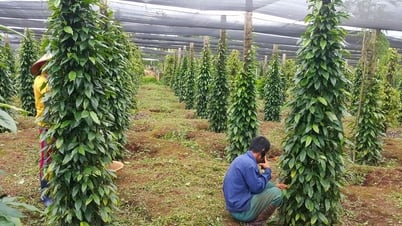



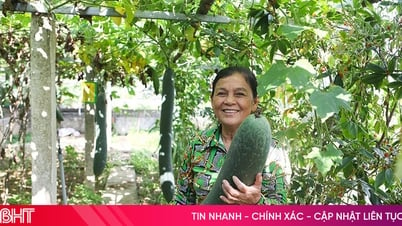


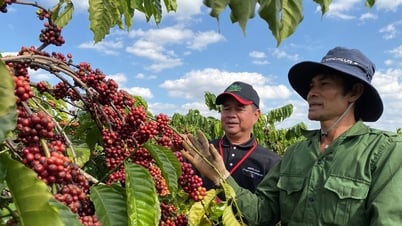





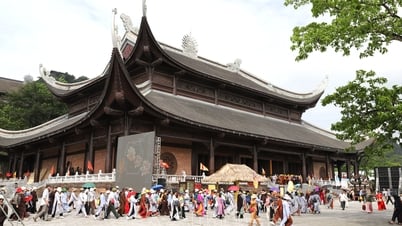




![[Photo] Nearly 3,000 students moved by stories about soldiers](https://vphoto.vietnam.vn/thumb/1200x675/vietnam/resource/IMAGE/2025/5/17/21da57c8241e42438b423eaa37215e0e)




















































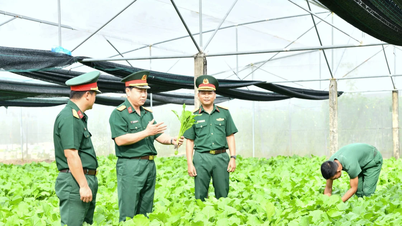














Comment (0)